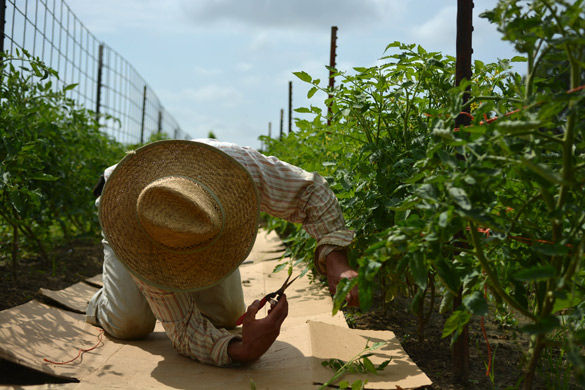From farm to fork: for some, local produce is paramount
June 24, 2015
Fifteen diners gathered on a verandah near an acre of farmland at La Colina Linda, a farm and bed-and-breakfast in Cobden, for fresh food and atmosphere Sunday at a farm-to-table meal; six courses, all vegan and gluten free, prepared by two trained vegan chefs.
Deb Kay, of Kelso, Wash., and Kathy Ward, a retired sociology professor from Carbondale, presented the meal by telling diners the origins of each ingredient, whether from the farm she shares with Jeri Kinser, of Rockford, or another within a 10 mile radius.
{{tncms-asset app=”editorial” id=”bf71246e-1ad6-11e5-9d4c-6ba1c5688fc0″}}
Advertisement
Some highlights included carrot soup featuring a vibrant burst of ginger and garnished with sweet raw beats and crème fraiche. Desert was strawberry rhubarb pie, rich and sweet, with a crust made of ginger that, unlike the carrot soup, provided a mellow secondary layer of flavor that settled at the back of the tongue.
The meal gave me feelings of disdain for my refrigerator, as it left me with complete satisfaction rather than my normal habit of eating until my stomach hurts and I hate myself.
The produce, picked or delivered only days before, came strictly from organic farms. The carrots were grown in a high tunnel just off the porch.
{{tncms-asset app=”editorial” id=”13370182-1ad6-11e5-8de0-cfc05bf62437″}}
“Some people don’t even realize that carrots and vegetables grow in the dirt,” said Kay, who travelled to southern Illinois on vacation to help co-chef for the evening, as she brushed mud from one of the carrots. Kay and Ward were both trained under chef and author Mark Reinfeld’s Vegan Fusion Program.
The kitchen was buzzing with people preparing the gourmet dishes while the diners read the menu and socialized with each other as the sun set. Mike Hatfield, 32 of Makanda, attended the dinner, eating a dish prepared from mushrooms he grew and delivered.
Hatfield provided the mushrooms as part of a community supported agriculture agreement where people pay farmers upfront for weekly deliveries.
Advertisement*
“They’ve been supporters of our mushroom CSA for a little over two years now,” Hatfield said. “Being vegan, they love it because mushrooms are a great protein source and meat substitute.”
Ward said they also provided rhubarb for the pie as well as turnips. They only source their food from local farmers who, while not always certified organic, maintain organic standards, Ward said.
Hatfield said larger cities and more progressive areas of the country have had farm-to-table restaurants for years in more upscale settings, but Ward and Kinser have created an experience unique to southern Illinois.
{{tncms-asset app=”editorial” id=”310ab27a-1ad7-11e5-be47-277ae507507e”}}
“It’s really cool that it’s happening here,” Hatfield said. “We’re a great place, but you wouldn’t really think of southern Illinois, with all its coal mines and prisons, as being a progressive food area, but it really is.”
The meals, aligned with the solstices and equinoxes to mark the changing of the seasons and crop growth patterns, highlight local food and farmers for their produce.
“No matter what you eat, there’s nothing like getting stuff that’s been picked hours before from the farm,” Hatfield said. “It beats food that’s been trucked from California and spent a week in refrigeration any day.”
Ward said she and Kinser started their farming beds in 2012, a bad drought year. She said their plot was mostly mowed grass with such hardened soil that it was nearly impossible for a shovel to pierce the ground, and there were no worms to be found.
In May 2013, after attending a farm beginnings course with the southern Illinois chapter of Food Works, a national not-for-profit centered on teaching sustainable farming and agricultural business, they started their B&B and held their first farm-to-table meal in April 2014.
{{tncms-asset app=”editorial” id=”8dbbd05e-1ab8-11e5-8a3c-fbce0c172d82″}}
Kathleen Smith, executive director of Food Works, said local food is available in southern Illinois.
“Most people here know how to eat off the farm and have been for a long time,” Smith said.
She said if people were to spend money on food sourced from southern Illinois, it would help the local economy.
“Local food is here and farmers need your support,” Smith said.
While La Colina provides one of the only farm-to-table dining experiences in southern Illinois, other businesses such as Longbranch Café & Bakery are familiar with serving locally grown food.
Elaine Ramseyer, manager of Longbranch, said some but not all of their produce is from Dayempur Farm, a local organic farm owned by the not-for-profit organization Dayemi Tariqat.
Jim King, the farm’s manager, said eating local produce gives better insight to food’s worth.
“You see how much effort it takes to actually grow this food in your own backyard or your own farm and you see the real value of it,” King said.
{{tncms-asset app=”editorial” id=”f03efa2a-1ad7-11e5-83bc-9f6dfe967045″}}
Smith said while some products will never be locally sourced, such as coffee and tropical fruits, foods should be bought from local farmers as opposed to imported from other countries.
“There’s no excuse for us to have imported tomatoes in summertime in southern Illinois” Smith said. “That right there should just be criminal. It shouldn’t happen. There’s no point. We used to be the tomato canning region of the country.”
She said people need to acknowledge the value of local food.
“The nutrition benefits of local food is something people need to recognize,” Smith said. “They need to understand that literally the stuff at the drive-thru is not good for your body.”
Advertisement








